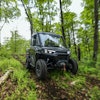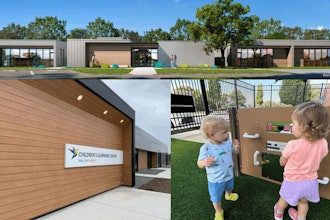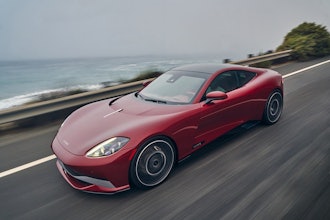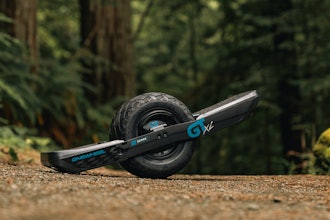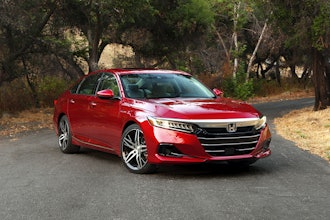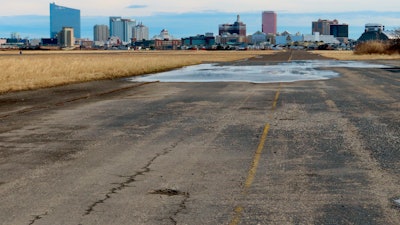
ATLANTIC CITY, N.J. (AP) — The airplane made Atlantic City's Bader Field famous, but it could be the automobile that resurrects it.
A $2.7 billion recreational, residential and retail project aimed at car lovers is being proposed for the historic but vacant former site of the first U.S. aviation facility to be called an “airport.”
DEEM Enterprises, a company based in both Los Angeles and Atlantic City, wants to build the project near the oceanfront and the city's casino-laden skyline.
It would consist of a 2.44-mile (4-kilometer) auto course on which car lovers can drive their high-end automobiles; about 2,000 units of housing in various price ranges; a retail promenade, and other auto-themed attractions.
“There is literally nothing like this anywhere in the world,” said Michael Binder, one of the company's principal members. “The latest trend in motor sports is the country club environment, where people bring their exotic cars, they stay there and become part of a motor sports community."
Atlantic City Mayor Marty Small endorsed the project as “the most credible proposal that this city has seen for Bader Field. I like it.”
New Jersey's Department of Community Affairs has the final say on whether the site is sold and what will be built there under a state takeover law enacted in 2016. No contract has yet been signed for the project.
Binder said his company has sufficient financing lined up, and has already spent $15 million planning it.
Bader Field, which closed in September 2006 after 96 years of aviation use, gave the world the term “airport” when a local reporter used the word in a 1919 article.
In 1910, it was the scene of the first attempt to cross the Atlantic Ocean by air, 17 years before Charles Lindbergh would succeed. Walter Wellmann lifted off in the dirigible “America,” only to ditch it off Cape Hatteras, North Carolina, when a storm hit shortly afterward.
Entertainers bound for Boardwalk ballrooms, business travelers and even U.S. presidents regularly flew in and out of Bader Field, but it remained the domain of small planes and private pilots; bigger jets landed at Atlantic City International Airport about 9 miles (15 kilometers) away.
Bader Field is where the Civil Air Patrol was founded shortly before the Pearl Harbor attack in 1941. But a series of fatal plane crashes soured city officials on its use.
The city tried several times to sell the 143-acre site, setting a $1 billion minimum price in 2008 but expecting at least $1.5 billion for one of the largest parcels of developable land near the ocean on the U.S. East Coast.
The thought was that at least three new casinos could be built there. Pennsylvania-based casino company Penn National offered $800 million, but the city held out for more, and a deal never happened.
The DEEM project would create more than 1,500 permanent jobs, and would include affordable workforce housing.
It would include private amenities like an Apex Club and the car track, but also publicly accessible areas including a boardwalk, nature trail, retail and other attractions along intracoastal waterways that surround much of the site.
Car owners would not need to be part of the club to use the track, but would have to undergo a rigorous safety course first, said Binder, who lives in Philadelphia and designed and built the Liberty Bell display and scoreboard at the Philadelphia Phillies home stadium, Citizens Bank Park.
There also would be two large car display towers of 5 and 10 stories, and some of the duplex units even incorporate high-end cars into the design, including a glass-enclosed garage in which a resident's car is visible from the entire first floor.
Storm resilience and energy efficiency would be integral parts of the project. Binder said the site would be elevated to make it less susceptible to rising sea levels and coastal storms by using spoils from a U.S. Army Corps of Engineers waterway dredging project to raise it between 7 and 35 feet (2 to 10 meters).
It would have its own power micro-grid, eventually powered by hydrogen, and would use geothermal wells for heating and cooling.
“This isn't about a racetrack; we're not holding races here,” said Atlantic City attorney Dan Gallagher, another of the partners in the development company. “The track is about 10% of what we're proposing here. This is about sustainability, jobs, green energy. It checks all the boxes. It seems like everyone has had an idea for this property, but nothing like this.”
It would include a hotel; a 4,000-seat amphitheater; an auto-themed museum; an esports video game playing facility and a sportsbook aligned with one of the city's existing casino licenses.
Binder estimated the project would take 10 years to complete, and said it expects to be eligible for various clean-energy incentives from the federal and state governments.


